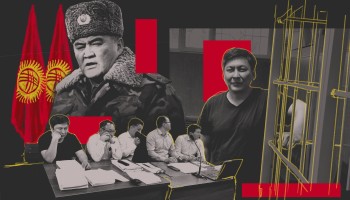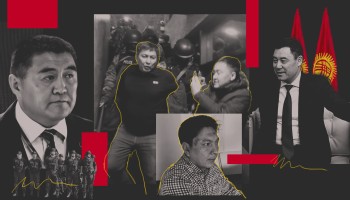Temirov and his employees allege the police planted a packet of hashish in the journalist’s pocket during the raid, in retaliation for Temirov LIVE’s work revealing high-level corruption, including an investigation published just days earlier into security service chief Kamchybek Tashiev.
Authorities say the searches were part of a legitimate criminal investigation. Temirov is currently on trial for possessing and selling drugs, falsifying documents, and illegally crossing the border, but he and rights activists say the charges are politically motivated.
Now, Temirov LIVE has published its own investigation into the raid using footage from the night he was arrested. It raises serious questions about the legitimacy of law enforcement’s actions, the integrity of the charges against Temirov, and who was pulling the strings.
The footage reveals that two unidentified masked men took part in the raid alongside drug police and interior ministry special forces — despite having no official role there.
One, the investigation found, may have planted the drugs on Temirov and prevented the police cameraman from catching that on video. The leaders of the raid also appeared to be receiving instructions by phone, likely from the GKNB, Kyrgyzstan’s powerful security service, which is led by Tashiev.
The government and GKNB have not responded to the report.
To piece together the events of January 22, Temirov LIVE gathered footage from security cameras in their office building, video taken by their journalists during the raid, and footage from the police cameraman who accompanied the officers.
The investigation found that the interior ministry registered the criminal complaint that would justify the raid the same exact minute that Temirov told his colleagues by phone he was heading into the office that afternoon.
As law enforcement officers approached Temirov LIVE’s offices later that evening, an unidentified masked man in camouflage ordered the cameraman and the interior ministry investigator to wait before they entered.
He and several officers then burst through the door and it closed behind them. When the cameraman and other officers tried to follow, they protested that the door was stuck. Journalists concluded they were acting for the camera, however, noting that the door at one point opened then was immediately pulled shut.
By the time the cameraman entered the office, a minute and two seconds later, the first set of officers had already forced the Temirov LIVE staff onto the floor and tied their hands behind their backs. Nothing is captured of the moment officers approached Temirov, and the police later said that a hard drive containing footage from the office’s security cameras was “damaged.”
When the police cameraman entered, his footage shows the unknown man in camouflage standing over Temirov then pulling the journalist to his feet. A rectangular bulge of what would turn out to be hashish, a cannabis derivative, is visible in the back pocket of Temirov’s jeans.
Throughout, the drug police and interior ministry special forces appeared to be receiving instructions from the two unknown masked men. CCTV footage showed these men going in and out of the office and taking phone calls, suggesting they were also reporting to someone else.
So too was the drug police boss who took over the search after one of the masked men left. Footage of him on the phone outside the Temirov LIVE offices, captured by reporters and analyzed with help from Bellingcat, show he was speaking to someone saved as “Batur SNB C5.”
SNB is an old abbreviation for the GKNB, the security service headed by the man Temirov had been investigating, Tashiev.
The investigation raises further questions about the criminal charges against Temirov, which many journalists and rights activists view as a politically motivated attempt to silence a critical voice and shield the Kyrgyz authorities from serious scrutiny.
Temirov founded Temirov LIVE in 2020 to pursue investigative journalism focused on exposing corruption and other misdeeds by politicians through video reports. He and his employees have been surveilled, slandered, assaulted, and prosecuted in retaliation for their investigative work.
Temirov is now facing up to 15 years in prison for possessing and selling drugs, falsifying documents, and illegally crossing the border. Temirov denies any guilt and says the charges are meant to “scare journalists, activists, and other citizens who are revealing [Kyrgyzstan’s] corruption and lawlessness.”
Last week, shortly before the first hearing in his case began, Temirov learned that Kyrgyz investigators had annulled his passport. The Kyrgyz authorities have previously suggested that Temirov is not actually a citizen of Kyrgyzstan and received his passport under false pretenses, accusations that he denies.
Editor’s Note: Bolot Temirov has been an OCCRP fellow and has collaborated with OCCRP, and with OCCRP partner Kloop, on several investigations.






